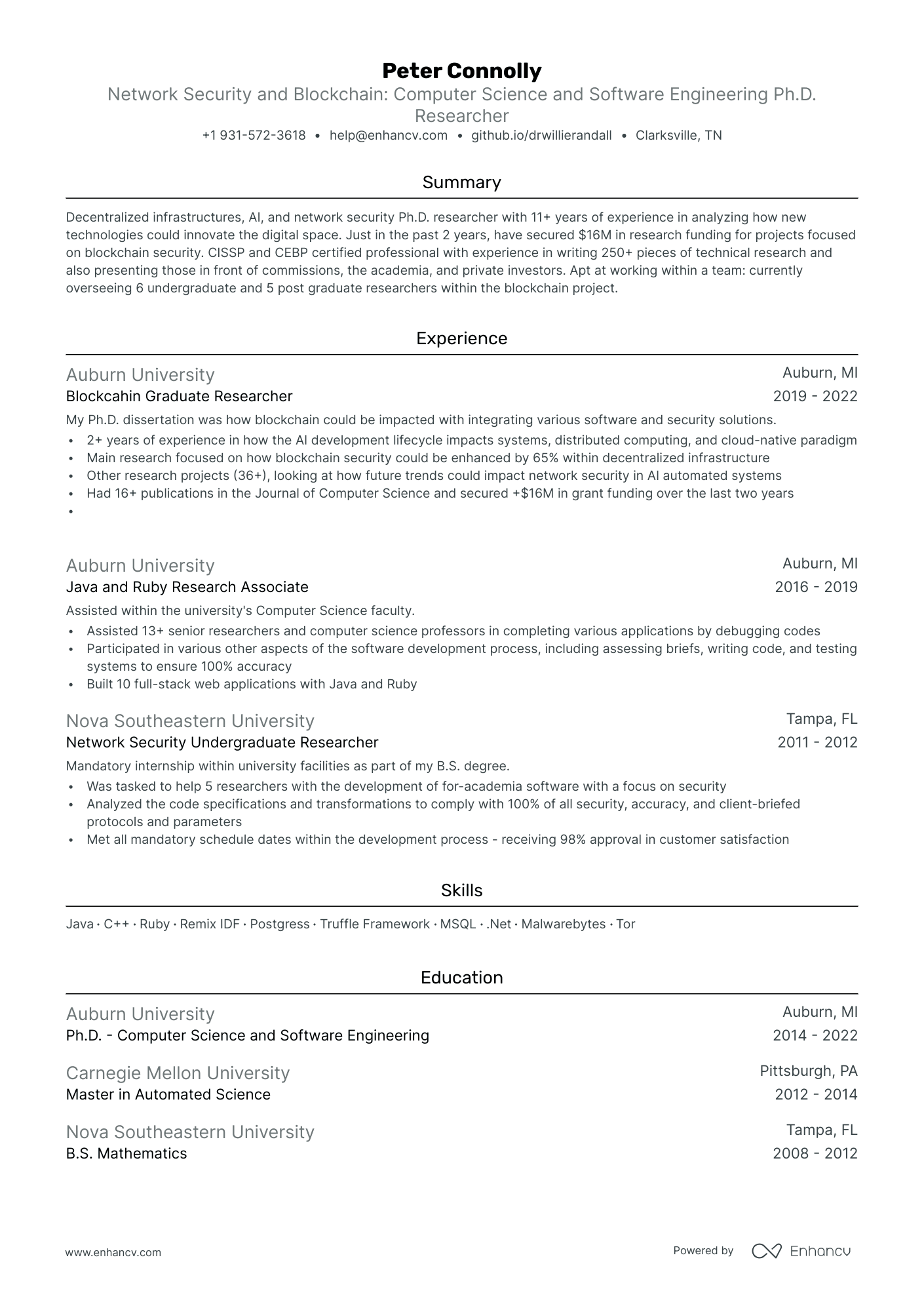
In pursuing a PhD, you are responsible for conducting original research, contributing to your field of study, and disseminating findings through publications and presentations. On your resume, highlight your dissertation topic, relevant teaching or mentoring experience, and any grants or fellowships you have received. Emphasize your analytical abilities, research methodology expertise, and proficiency in statistical software or programming languages. Mention any collaborations with industry partners or significant conference presentations to illustrate the impact of your work.
All Resume Templates Peter Connolly Network Security and Blockchain: Computer Science and Software Engineering Ph.D. Researcher +1 931-572-3618 help@enhancv.com Clarksville, TNDecentralized infrastructures, AI, and network security Ph.D. researcher with 11+ years of experience in analyzing how new technologies could innovate the digital space. Just in the past 2 years, have secured $16M in research funding for projects focused on blockchain security. CISSP and CEBP certified professional with experience in writing 250+ pieces of technical research and also presenting those in front of commissions, the academia, and private investors. Apt at working within a team: currently overseeing 6 undergraduate and 5 post graduate researchers within the blockchain project.
Experience Blockcahin Graduate Researcher 2019 - 2022 Auburn UniversityMy Ph.D. dissertation was how blockchain could be impacted with integrating various software and security solutions.
2+ years of experience in how the AI development lifecycle impacts systems, distributed computing, and cloud-native paradigm
Main research focused on how blockchain security could be enhanced by 65% within decentralized infrastructure
Other research projects (36+), looking at how future trends could impact network security in AI automated systems
Had 16+ publications in the Journal of Computer Science and secured +$16M in grant funding over the last two years
Java and Ruby Research Associate 2016 - 2019 Auburn University Assisted within the university's Computer Science faculty.Assisted 13+ senior researchers and computer science professors in completing various applications by debugging codes
Participated in various other aspects of the software development process, including assessing briefs, writing code, and testing systems to ensure 100% accuracy
Built 10 full-stack web applications with Java and Ruby Network Security Undergraduate Researcher 2011 - 2012 Nova Southeastern University Mandatory internship within university facilities as part of my B.S. degree.Was tasked to help 5 researchers with the development of for-academia software with a focus on security
Analyzed the code specifications and transformations to comply with 100% of all security, accuracy, and client-briefed protocols and parameters
Met all mandatory schedule dates within the development process - receiving 98% approval in customer satisfaction
Truffle Framework Malwarebytes Ph.D. - Computer Science and Software Engineering Auburn University 2014 - 2022 Master in Automated Science Carnegie Mellon University 2012 - 2014 Pittsburgh, PA B.S. Mathematics Nova Southeastern University 2008 - 2012 Training / Courses Certified Information Systems Security Professional (CISSP) Certified Information Security Manager (CISM) Certified Enterprise Blockchain Professional (CEBP) 101 Blockchain Industry Expertise Network Security Blockchain Programming Languages www.enhancv.com
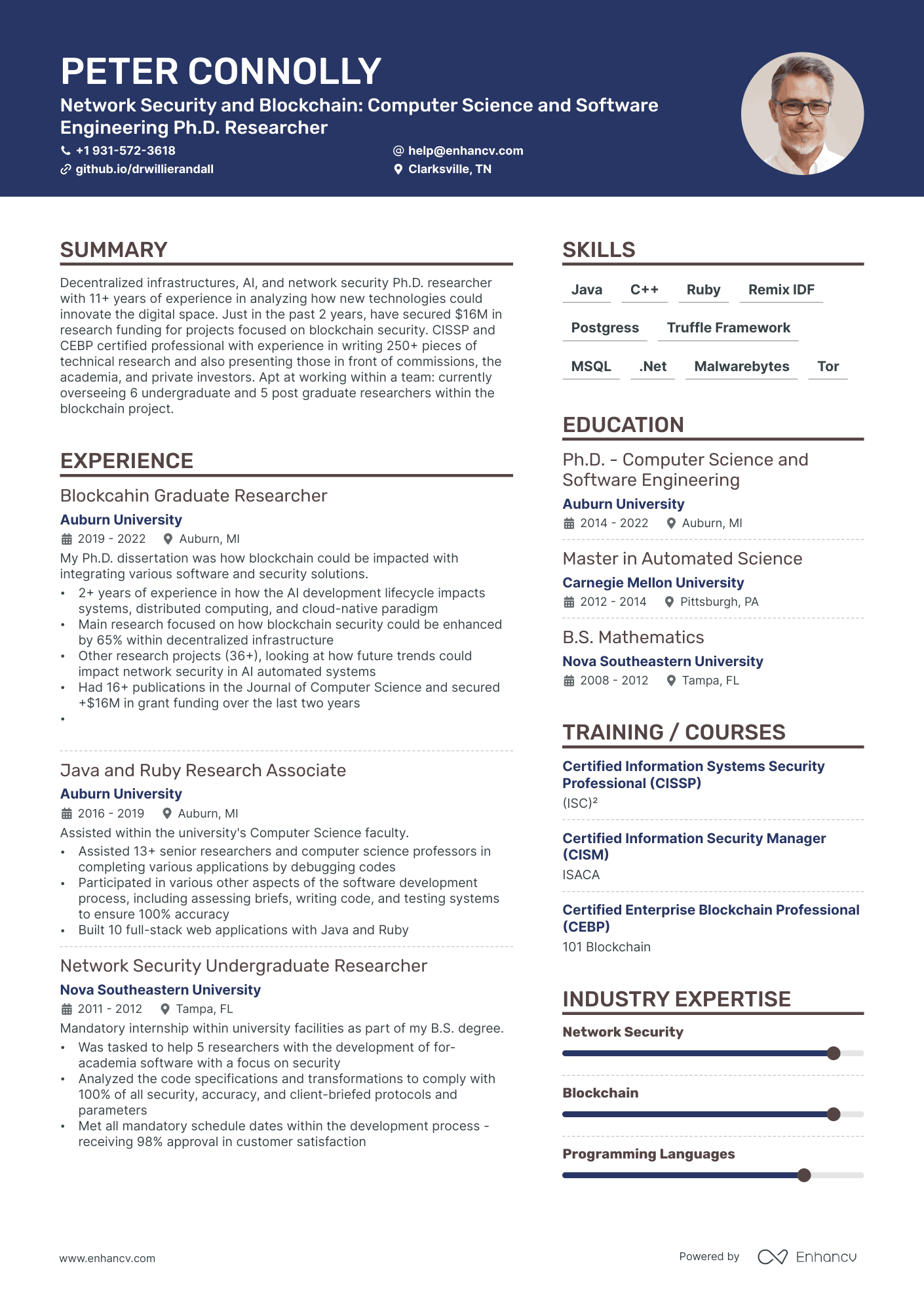
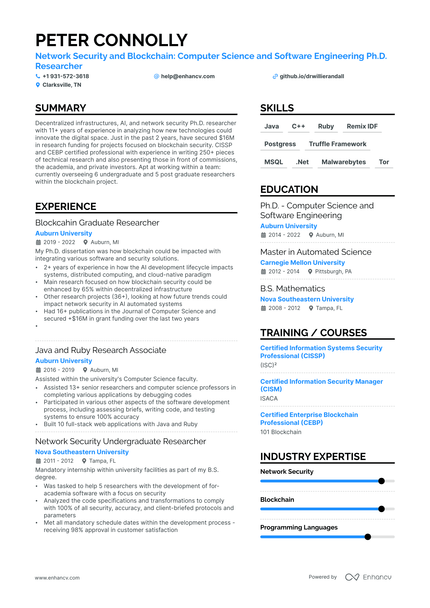
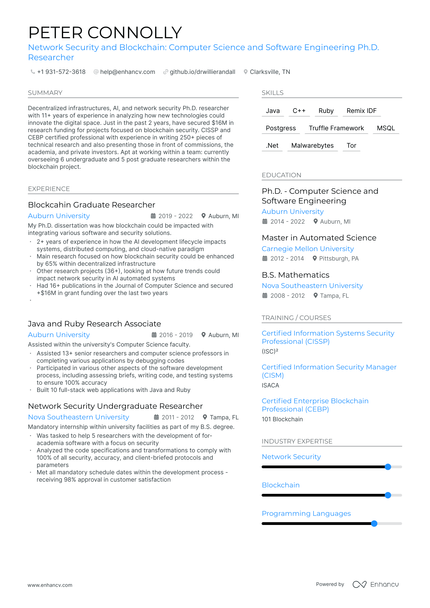













George C. Jones's 8-year-Odyssey to his doctoral degree in engineering is finally complete. All he has to do now is complete his Ph.D. resume.
Little does George know that within the next three years, he'd apply to 500+ roles and still not be any closer to working in the renewable energy sector.
A little birdie told us why.
Everywhere George applied, he was labeled as an "egghead": book-smart with no real-world experience.
At least that's the story his resume told.
Unfortunately, George's sad "tale" depicts many graduates’ job searches.
By 2030/31, the US is expected to have 221,000 Ph.D. graduates. While this may be fantastic news for the academic community, the job pool is limited.
Swimming into the big blue sea - a.k.a. the "real world" - would require Ph.D. graduates to adapt their resumes to the business or industry requirements.
And listing vague bullets pinpointing your experience just won't do.
Enhancv knows how to translate your skills, knowledge, and achievements to ensure your resume stands out in the vast talent pool.
Because a well-written Ph.D. resume, showing skills, passion, and knowledge, is your ticket to the moon and beyond.
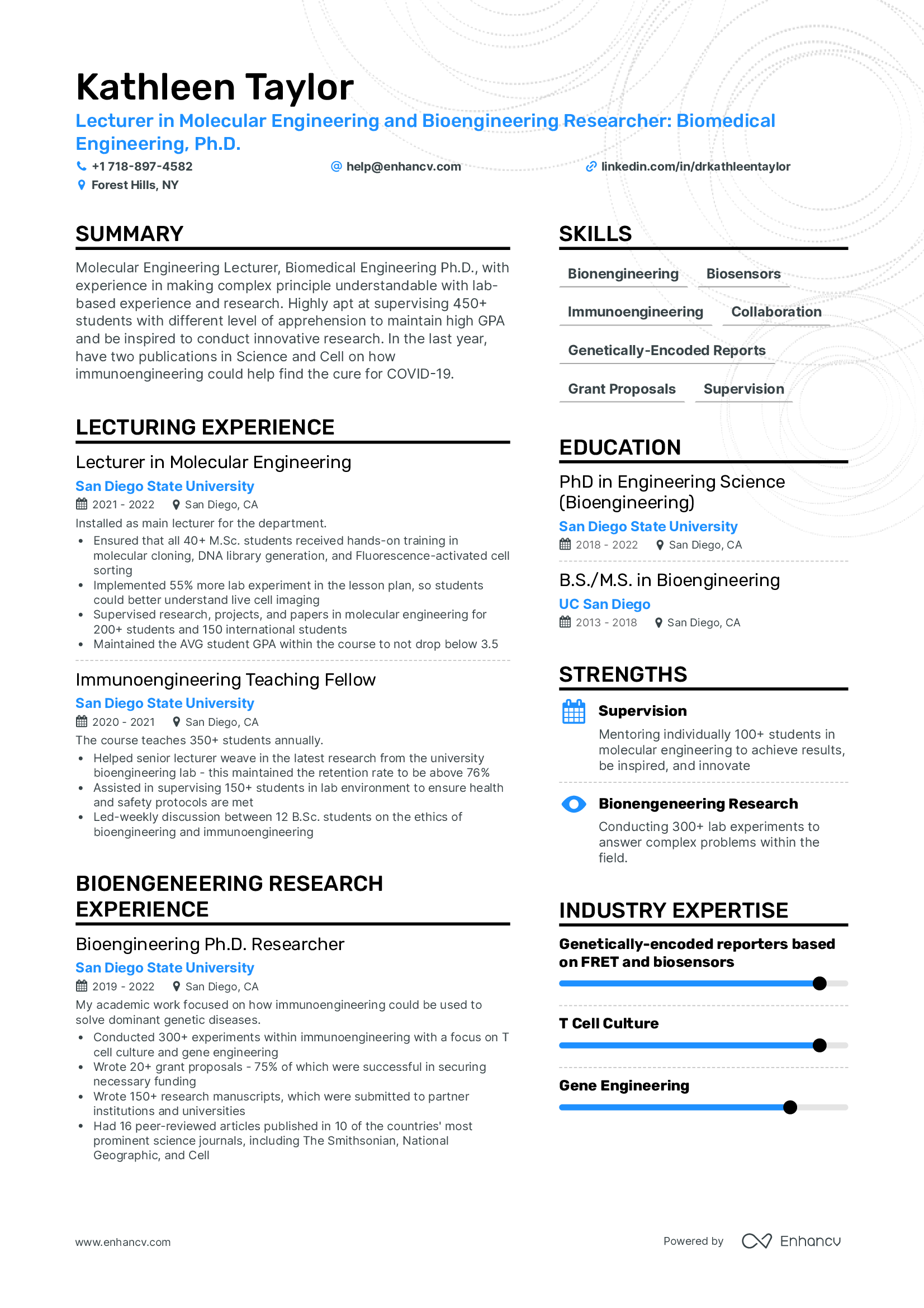
This Ph.D. Bioengineering Graduate has certainly focused her effort on getting that tenure-track position.
Here’s why her resume works.
Within the top one-third of Dr. Taylor’s resume (the headlines, summary, and skills section), you’ll find many relevant keywords for the job advert.
She has also used the summary to qualify and quantify her results to help recruiters better understand her strengths.
The experience section is split into two parts: the first one notes all relevant teaching experience; the second section showcases depth and knowledge of research.
Dr. Taylor has included industry experience and strengths to further define her skill set and show results.
This approach would also be very helpful for any Applicant Tracking System (ATS) reviewing the resume, as it cross-aligns the candidate’s talents with the job requirements.
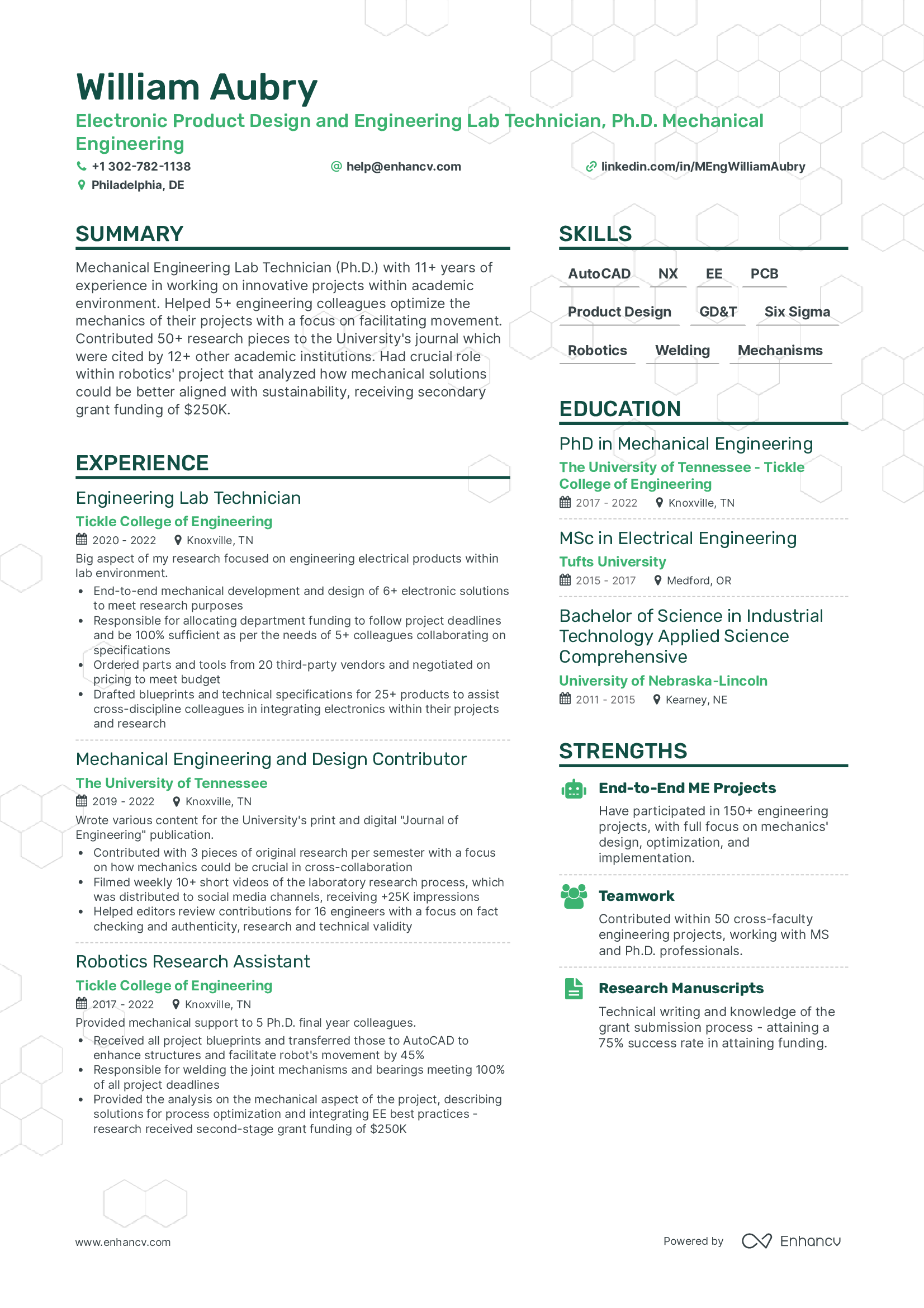
If you’re wondering how to translate your academics into real-life experience, check this example out.
Dr. Aubry’s resume headline highlights his area of expertise and his Ph.D. degree, while his summary qualifies his key academic achievements, contributions, and success.
Dr. Aubry’s skills section focuses more on the technology he is apt at within the specified job requirements.
His roles as a lab technician, contributor, and research assistant also hint to recruiters that he’s results-oriented and can show how his work affected the industry.
Finally, his strengths section cross-aligns soft skills that are important for the role, including mechanical engineering knowledge, cross-disciplinary teamwork, and technical writing.
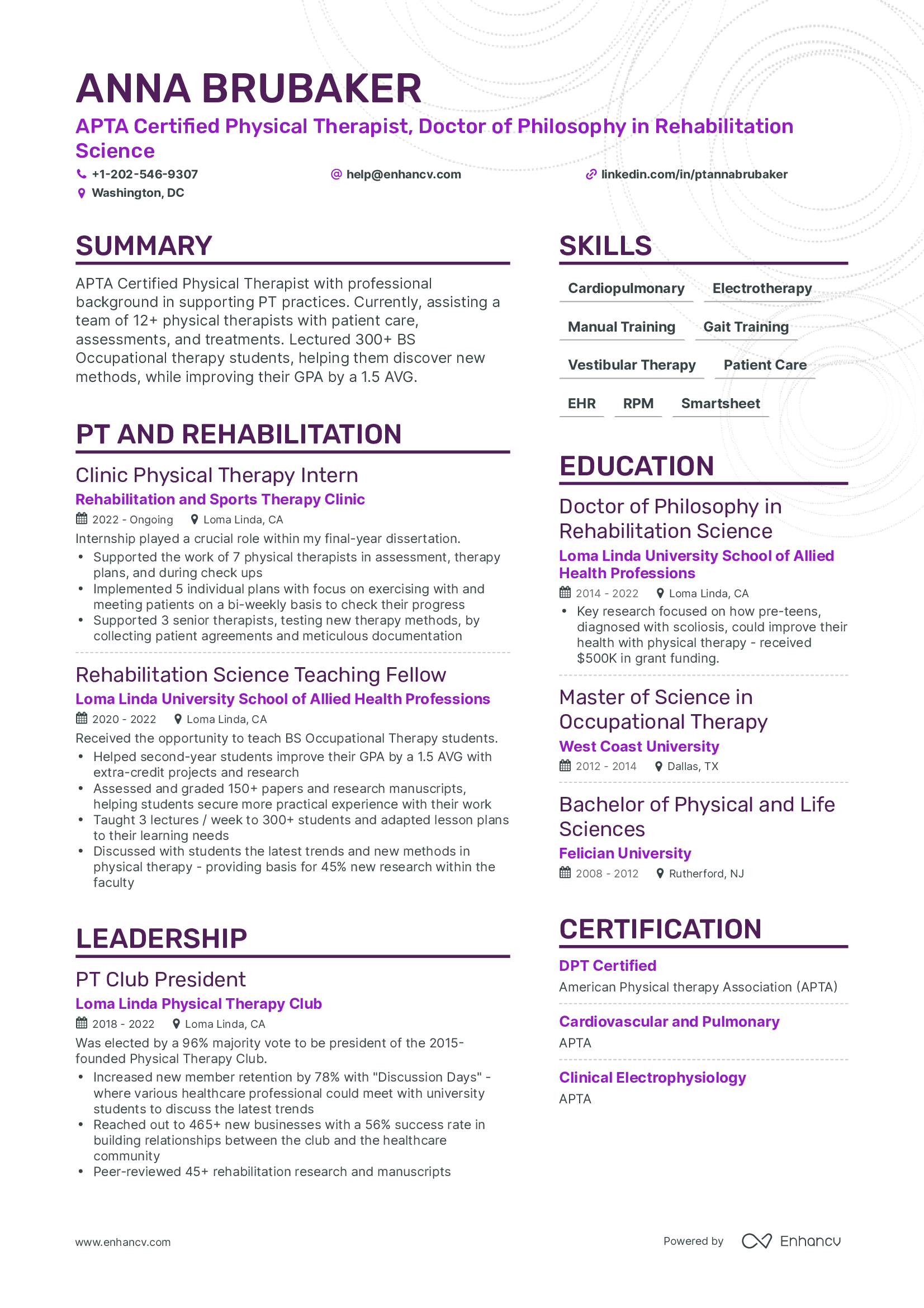
In some industries, a specific certification can be a real game changer to meeting ATS standards.
Dr. Brubaker knows this and that’s why she has used her resume to highlight her American Physical Therapy Association (APTA) certification within various sections (headline, summary, and certification).
Another reason why Dr. Brubaker’s resume works is that it pinpoints her niche of expertise with tangible results.
Her education section not only lists all of her degrees, but she has turned recruiters’ attention to the grant funding her Ph.D. thesis secured (an outcome of the project).
Did you notice how she curated the experience section? Dr. Brubaker started with her more job-oriented responsibilities, followed by a leadership role.
if you’ve participated in any extracurricular activities during your studies, they could indicate various soft skills on your resume, including leadership, initiative, organization, etc.
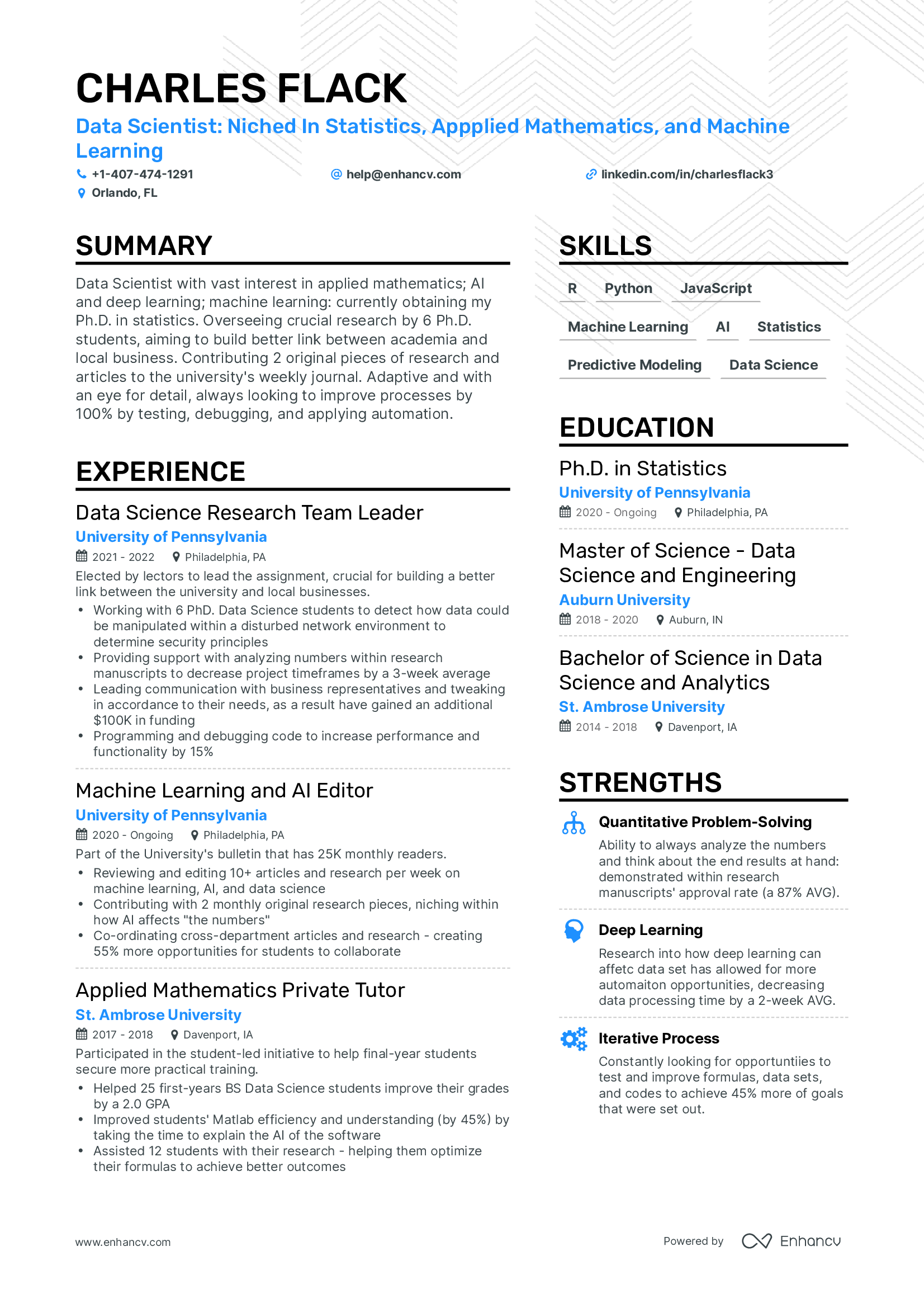
Are you a current Ph.D. student, wondering how to include your ongoing degree on your resume?
Charles Flack’s resume includes some of the best how-to practices.
Charles uses the resume headline and summary’s first section to specify his research niche, which is followed by his ongoing Ph.D. Status.
N.B. Remember that the recruitment process is one of building trust with honesty. If you note in your resume that you’re a Ph.D. graduate (without this being the reality), recruiters will find out.
Continuing with Charles’s resume summary. It goes on to include an array of expertise and soft skills (e.g. leadership, adaptiveness, perfectionism) all within achieved results in academia.
His experience section includes roles in leadership, technical writing, and private tutoring, denoting individual skills and contributions.
The strengths Charles has included are more specific and tie in with data science roles. Those include quantitative problem-solving, deep learning, and iterative process.
Let's start with a big no-no: your academic CV, the one you used to secure that tenure position, is a No-go. Put simply - it lacks personality.
HRs and the Applicant Tracking System (ATS) need more context to your experience.
Unfortunately, here comes one of the biggest disadvantages you may face, leaving academia. Often, Ph.D. graduates get rejected as they lack practical work experience.
Don't get discouraged. Instead, find a resume format that works for you.
For Ph.D. graduates that have less work experience, we recommend a functional-skill-based format. It will help you highlight your unique skill set and academic excellence.
Also, it'll align your niche area of expertise with the role expectations.
Now that we've settled the formatting debate, let's look at a couple of more quick pointers for your Ph.D. resume.
1. The top one-third of your resume - the resume header and summary - is crucial to getting a high score on the ATS.
That's why you should try to include as many of the advert's relevant requirements within this section.
2. Expand your qualifications and skills within the experience section.
Don't just list plain bullets, but focus on the outcomes of your studies, research, or publications.
You can use the following formula to write each experience bullet: **Verb + Who/ What + Impact or How**
3. Speaking of impact, detail your accomplishments within your academic work.
Focus on the picture and your research's influence on the scientific field, business/ industry, or communities.
Bonus: Remember to always list all work and academic experience that is relevant to the job you’re applying for.
Your Ph.D. experience can open many doors for you, giving you a front-row seat on the cutting edge of new technologies.
But let's not get ahead of ourselves, here are a couple more bits and pieces to keep in mind when writing your Ph.D. resume.
Your Ph.D. resume should balance your knowledge with how fast it can be applied in a real-world environment.
That's why you need to be precise about the resume sections you chose to prove your merit.
After endless hours of searching different platforms, you've finally found that cancer research position that perfectly matches your profile.
Avoiding all emotional attachment and excitement, you finally decide on the following header:
Let’s look at the bright side of things. If the organization would like to get in touch with Dr. Garnett, they'd easily find his contact details.
But on the other hand, he is making one huge mistake: Dr. Garnett isn't taking advantage of the power of the top section of his resume. More specifically - his headline.
This crucial section could provide Ph.D. graduates with an opportunity to include all relevant keywords that could match their profile. And at the same time, tease their professional story.
David Garnett Cancer Research Ph.D. Graduate: Specialized In Cancer Risk Factors; Cell and Tumor Biology +334-294-4506 help@enhancv.com Montgomery, AL RIGHTThis may be obvious, but this example works as it shows that Dr. Garnett is not only a Ph.D. graduate, but his specific area of research and interest, which should supposedly match with the role he’s applying for.
A rule of thumb for headers is to never be vague about your research and expertise.
You could list your Ph.D. degree within your resume title so that it’s the first thing recruiters (and the ATS) see.
In the case of Dr. Garnett, his resume title could read “Dr. David Garnett, Ph.D.”.
Our suggestion is to be wary about the organization you’re applying for because if the culture is more informal, this may come off as “pretentious”.
The Ph.D. resume summary is a really useful section for good first impressions and explaining your experience.
The summary can be used to highlight your skills, strengths, and achievements. While telling the story of your professional growth.
We know how important real-world examples are for you.
So, without further ado, here's how Dr. Lucina Collard rewrote her resume summary. And in the end, got the attention of a prestigious software development company.
Ph.D. Graduate in Mechatronics with high grades in Human-Robot Interaction, Robotics, Digital Control Systems, Mechatronics, Industrial Control. Wrote thesis on “Designing and implementation of PID controller robotic arm”. Passionate about programming robots and working with people.
WRONGDr. Collard may have spent too much time in the lab, as her Ph.D. resume summary just lists what courses she took and her thesis statement.
No results, no outcomes.
In the end, she did decide to include some soft skills and passions, but without actually pointing out the “why” behind her work. This doesn’t make sense at all.
Here’s what her modified resume summary looked like in the end:
Professional with 6+ years of experience in robotics engineering with Ph.D. in mechatronics from Kent State University. My work in designing, implementing, and testing various mechanical and electrical ecosystems, won the 2021 30 Under 30: Engineer accolade. Throughout my academic experience, I have cooperated on 60+ different projects with Ph.D. students from different academic backgrounds, including Engineering, Manufacturing, and Design, to always complete projects with a 95% success rate. My thesis was more hands-on and focused on the whole process of designing, prototyping, fabricating, and testing PID controller robotic arm.
RIGHTThis summary works for one simple reason: it qualifies the achievements.
Dr. Collard has noted that within the past 6 years, she has been specializing in the job advert keywords “robotics” and “mechatronics”. The award is also a nice touch to paint the big picture of her experience.
Dr. Collard is apt at achieving results within a dynamic environment. That includes various professionals from different backgrounds.
When talking about her thesis, she goes on to show her familiarity with the process.
Editing Dr. Collard’s summary may seem just like one small step for her, but it’s actually a giant leap to securing an interview.
When listing their experience section, most Ph.D. graduates are probably making the same mistakes.
The first one: leaving out your academic practice, thinking that recruiters only want to see work experience.
That's not true at all.
Your education would not only prove your technical capabilities, but also your soft skills. But, more on that in the following paragraphs.
The second error: those tricky job titles.
You'd find 1000+ resumes, listing each experience using the given academic titles; e.g. Professor, Lecturer, Post Doctorate Student, Graduate Student, etc.
Robotic vs personalized approach: 1:0.
The ATS, reviewing your resume, is set to recognize keywords that are vital for the job. The faster those appear at the top of your experience, the better.
Instead of listing that you used to be a "Lecturer at XYZ University", go with "Data Science and Machine Learning Lecturer at XYZ University".
Third slip-up: those tricky experience bullets.
Some Ph.D. graduates just list all their courses, research, and publications.
This isn't the way to go.
You should rather align your knowledge with the job description to prove tangible results.
A couple of questions to help:
Let’s look at an example of how your experience can be showcased within your resume as crucial for the job.
This experience section is pretty negligent and robotic. Did you just get a diploma during those three-plus years?
You may be exiting from a leading higher education institution, but putting in the extra effort to your resume shows that you are diligent.
And that you’re actually invested in getting that particular job.
Experience Philosopher, PhD California Institute of Technology 02/2018 - 11/2021 Pasadena, CA Company DescriptionContributed 60+ publications to the university scientific journal, niching within human rights, ethics, and the big why of human existence
Peer-reviewed publications for 12+ philosophy colleagues and professionals with a focus on consistency and validity of the thesis
Collaborated with 10+ professionals from arts, science, and biotech fields to question and understand the ethics behind their projects
Apart from the scientific paper for my final thesis, entitled 'To Be Or Not To Be: The Ethics of The Human Existence In The 21st Century’, published a short video on the university website to help inspire young professionals of philosophy to always stay alert
RIGHTThere’s no ground for comparison between the two examples. But let’s look at some of the basics.
The first experience bullet hints that the professional can write technical papers for their niche.
Next, the candidate showcases an eye for detail, collaboration, and teamwork.
Finally, they have found a way to get their thesis submitted on time and also make it more understandable.
On a side note - did you notice how a better job title could be a complete game-changer?
General practice is that you'd create one single resume experience section.
But what if while writing your Ph.D. resume, you realize that in the past six years, all your experience is for the same institution?
Here's an idea to spice up your experience section. You can create a couple of experience sections, based on functionality.
Thus highlighting job advert keywords and, at the same time, including more details.
So you could have some of the following headers, under which you could classify your work:
Feel free to align your transferable skills, which would be beneficial for the job you're applying for.
Here's the advice you've probably been waiting for; introducing…
… "How to write about your degree without sounding like a snob?"
And there are two possible scenarios at play.
The first is that you're applying for a job related to your area of study.
You should list your Ph.D. degree in detail, including research topics, method expertise, and publications.
As you're writing for non-specialized audiences, don't go overboard with the complex terms. Instead, weave keywords from the job requirements within your education section.
In the second case scenario, you're applying for a job that has nothing to do with your degree.
Keep your education section plain and simple with your degree, university/college, dates, and location.
Either way, remember to always list all of your degrees in chronological order, starting with the latest.
This isn't just some made-up rule or HR caprice. Your resume education helps recruiters determine if:
Being transparent on your Ph.D. resume is what builds that fantastic initial relationship with the company you're applying for.
Thus, you have to be very clear and precise, especially in your education section.
If you're still pursuing your Ph.D. degree, shift the focus from the future to what you've achieved so far.
Your education section could answer any of the following questions:
Being on the course to completing your Ph.D. is definitely commendable, but sometimes life happens. And you may be forced to drop out of your Ph.D. education.
The answer is 100% yes, as your Ph.D.:
Making it clear to recruiters that your degree is "Incomplete" or that you "Didn't Graduate" is very important.
List your degree, dates, university/college, and status.
If you get to the interview stage, recruiters will ask you why you dropped out. Be prepared to talk about why it wasn't the best option for your career at the time, or hint at the circumstances.
Even if it's hard to believe, HR managers are people - just like you and me - and they are able to show understanding and compassion.
Recruiters review your resume to see how your experience aligns with the role, with a big focus on transferrable skills.
Or in other words, what else can you bring to the table to help the business or institution grow?
And transferable skills can be both hard (or technical) and soft skills.
Your hard skills include the technology you used to complete your studies.
Consider the opportunities you've has to:
The list can go and on and on. Your Ph.D. has probably provided you with a pretty solid technical background.
When writing your resume’s separate technical skills section, ever wonder which technology should go first?
Rule of thumb: align the technology within the job description with your expertise.
The more proficient you are at a certain skill, the sooner you should list it.
Wondering what some of the most popular Ph.D. resume hard and technical skills are?
Check out our list, based on some of the most popular industries.
15 hard skills for opportunities in business consulting:
15 technical skills for biology, biotech, biochemistry, and medical research:
15 engineering technical skills to add to your PhD resume:
15 recommended computer science technologies:
15 academic and research technical skills:
There's still no precise formula for how soft skills are gained and applied in the workplace.
How many times have you seen an advert that requires "a can-do attitude and teamwork"?
Yet soft skills are on all recruiters' must-have checklists.
In the case of Ph.D. applicants, these transferable skills are built thanks to all the healthy habits you've maintained through your education, including your:
Soft skills hint to recruiters more about your character and style of work.
Here are some ideas as to which ones you can include within your resume:
Presenting Grant ProposalsIn the past 3 years, have presented 60+ proposals with a 98% success rate. Receiving feedback about ability to present research with enthusiasm and make complex data understandable.
Peer CollaborationWorked on 12+ projects with peers on interdisciplinary breakthrough research within robotics and engineering; contributed to the mechanics aspect of the work.
Critical Thinking within EngineeringCreated 40+ papers and projects by critically analyzing key engineering problems. As an example, my most recent publication, which gained approval by various industry professionals, looks at how medical devices' wireless functionality could be improved by investing in more complex antenna design.
RIGHTWhen describing your leadership or mentorship soft skills, here are a couple of questions you could answer within your resume to qualify your achievements:
Back in the day, you earned a couple of extracurricular certificates and wondering if you should include those on your Ph.D. resume.
Again, it's a matter of analyzing how necessary your certification is for the job.
E.g. if AICPA's CPA certificate is listed as obligatory within the job description - and you have earned yours - you know what to do.
Certificates show that you're willing to put in the extra effort to stay relevant. Proving that you're committed, flexible, and a life-long learner.
So, think about the relevancy the certificate would have within your field.
Then, consider including some of these popular certificates:
When completing your Ph.D. resume, you should always find ways to stand out from the crowd.
That’s why we’ve compiled for you some of the most popular sections which you could add to your resume.
Before doing so, always question each section's relevance to the job you're applying for.
One final word of warning - your Ph.D. resume offers limited space to showcase your expertise, so try to make the most out of it.